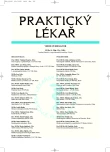-
Medical journals
- Career
Smoking of children on primary schools – results of the project „Our class doesn’t smoke“
Authors: V. Zachovalová
Authors‘ workplace: Vedoucí: prof. MUDr. Zuzana Brázdová, DrSc. ; Ústav preventivního lékařství LF MU, Brno
Published in: Prakt. Lék. 2007; 87(6): 359-362
Category: Of different specialties
Overview
The article summarizes an experience and knowledge from the project „Our class doesn’t smoke“. It is focused on pupils of the second grade at the elementary schools; it contains quantification of addiction and treatment of smokers. Data were collected by means of questionnaires. The aim is to find out an extent of project efficiency by means of comparison of attitudes of the pupils to smoking in interested and uninterested classes. It was possible to observe an influence of different factors and circumstances on children’s smoking in the inquiry. Approximately ninety students of the elementary schools in the Vysoãina region were integrated in the pilot study. As the project was successful, we continued in its further realization. In the second year of this project two hundred and fifty-nine students from the three elementary schools in Brno and two schools: in Kostelec u Hole‰ova and in Fr˘dek – Místek have participated. In accordance with all indicators, the competition with a good management and active position of teachers and students is the model for putting off, reduction and abandonment of smoking.
Key words:
„Smokefree Class Competition“, youth, attitudes of juniors
Labels
General practitioner for children and adolescents General practitioner for adults
Article was published inGeneral Practitioner

2007 Issue 6-
All articles in this issue
- Sleep related breathing disorders in adults
- Intravenous port-a-cath in clinical practice
- Head lice is still actual
- Ethical aspects of sociological research on patients
- Uncertainty as a component of general practice
- Oral Hygiene – Related Quality of Life
- Attitude of GPs to prevention
- Examination of the scene of death in a hanging
- Smoking of children on primary schools– results of the project „Our class doesn’t smoke“
- The potential of fosinopril to improve the control of hypertension and its tolerability in out-patient practice
- Adverse effects of antipsychotic drugs: new risks and how to identify them
- General Practitioner
- Journal archive
- Current issue
- Online only
- About the journal
Most read in this issue- Examination of the scene of death in a hanging
- Adverse effects of antipsychotic drugs: new risks and how to identify them
- Sleep related breathing disorders in adults
- Oral Hygiene – Related Quality of Life
Login#ADS_BOTTOM_SCRIPTS#Forgotten passwordEnter the email address that you registered with. We will send you instructions on how to set a new password.
- Career

